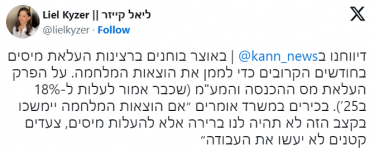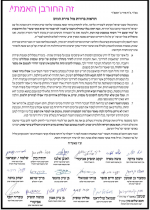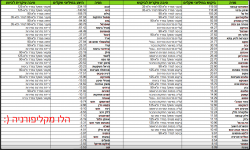אתה משתמש בדפדפן מיושן. יתכן והאתר הנוכחי יוצג באופן שגוי, כמו כן אתרים אחרים ברשת.
אנא שדרג את הדפדפן או השתמש בדפדפן חילופי.
אנא שדרג את הדפדפן או השתמש בדפדפן חילופי.
הרפתקאות ותעלולים בשוק ההון הישראלי
- פותח הנושא deltaZer0
- פורסם בתאריך
deltaZer0
Well-known member
deltaZer0
Well-known member


המחטף של ש"ס: הממשלה צפויה לאשר תיקון שיאפשר ג'ובים למקורבים | ישראל היום
משרד הדתות בממשלה הקודמת ביצע רפורמה שקידמה נשים במועצות הדתיות והגבילה את זמן המינוי - בש"ס פועלים לחזרה למודל הקודם • באמצעות התיקונים החדשים, יוכלו בש"ס למנות מקורבים, שאינם עומדים בתנאי הסף והכשרתם מסתכמת בלימודים בכולל חרדי

נערך לאחרונה ב:
deltaZer0
Well-known member

סמוך לבית הכנסת: נחשד שביצע מעשה מגונה בילדה - בחקירה התגלו עוד קורבנות - כיפה
שוטרי מחוז מרכז חוקרים חשד למעשה מגונה בקטינה שאירע לפני כשבוע במושב באזור השרון. המשטרה פונה לציבור ומבקשת שככל שישנם קורבנות נוספים, יש לגשת לתחנת המשטרה


Tens of thousands of pedophiles operate in Israel every year
In July alone, there were 22 cases of pedophilia recorded in Israel and brought to the attention of the media

Israel is trying to legalize pedophilia - Avi Maoz
The age of consent in Israel is 16 for all genders but can be as low as 14 provided both parties consent and have a 3-year age gap or less.

נערך לאחרונה ב:
deltaZer0
Well-known member
deltaZer0
Well-known member

איתי אנגל: "לא העליתי על הדעת שדברים משיקים יהיו כאן"
איתי אנגל רגיל לסקר אזורי קרבות קשים ביותר, אך עדיין מתקשה להאמין שרואה קווים מקבילים עם האירועים בחודשים האחרונים כאן בישראל. בפרויקט מיוחד של "עובדה", העיתונאי מתעד את מטולה הריקה ונכנס לחמ"ל שהקימו התושבים
deltaZer0
Well-known member
הנה זה מגיע...

כתבתי על כך לפני חודשים.
לא צריך להיות גאון בשביל זה.
רק מבט ביקורתי, ללא הכחשת האמת -- ההכחשה המוחלטת העיוורת הישראלית.
המציאות נכנסת בלי לדפוק בדלת, הרבה יותר לפני הסיום.
מה יהיה אחרי ה-"ניצחון המוחלט"???
קריסה מדינית, חברתית וכלכלית.
סוף ה"פרויקט".
בן גביר - ראש הממשלה.
דרעי -משיח הנשיא
קרעי - שר האוצר(כן-כן, סמוטריץ' אנד קומפאני -- ייזרקו למרות הכול, כי אלה "אשכנזים מסריחים" בסופו של יום)
אמסלם - שר ההגנה
רגב גרב - שרת ההתקפה
גוטליב - שרת התרבות והשב"כ
מאי גולן - שרת התקווה(של נהגי המוניות ואינסטלטורים)
יחד ננצח!
תברחו מכאן, עד שלא יהיה מאוחר מידיי...
(אם יש לאן )
)

כתבתי על כך לפני חודשים.
לא צריך להיות גאון בשביל זה.
רק מבט ביקורתי, ללא הכחשת האמת -- ההכחשה המוחלטת העיוורת הישראלית.
המציאות נכנסת בלי לדפוק בדלת, הרבה יותר לפני הסיום.
מה יהיה אחרי ה-"ניצחון המוחלט"???
קריסה מדינית, חברתית וכלכלית.
סוף ה"פרויקט".
בן גביר - ראש הממשלה.
דרעי -
קרעי - שר האוצר(כן-כן, סמוטריץ' אנד קומפאני -- ייזרקו למרות הכול, כי אלה "אשכנזים מסריחים" בסופו של יום)
אמסלם - שר ההגנה
גוטליב - שרת התרבות והשב"כ
מאי גולן - שרת התקווה(של נהגי המוניות ואינסטלטורים)
יחד ננצח!
תברחו מכאן, עד שלא יהיה מאוחר מידיי...
(אם יש לאן
נערך לאחרונה ב:
deltaZer0
Well-known member
בנוגע הכחשת המציאות והאמת, לאופטימיות העיוורת הישראלית, במיוחד בשוק ההון...
הנה, קטע קטן מדו"ח שנתי(עבור שנת 2023) שפורסם לא מזמן ע"י חברה ישראלית אחת דואלית AUDC/אודיוקודס.
בעצם, היא חושפת את הדברים בפני המשקיעים שלה במבוא לדו"ח השנתי:
Risks Related to Operations in Israel
Conditions in Israel affect our operations and may limit our ability to produce and sell our products or raise finance and instability in the Middle East may adversely affect us. We are incorporated under the laws of the State of Israel, and our principal executive offices and principal research and development facilities are located in the State of Israel. Political, economic and military conditions in Israel directly affect our operations. There has been an increase in unrest and terrorist activity in Israel, which has continued with varying levels of severity for many years through the current period of time. This has led to ongoing hostilities between Israel, the Palestinian Authority, other groups in the West Bank and the Gaza Strip, and the northern border with Lebanon, as well as in the Golan Heights. The future effect of these conflicts on the Israeli economy and our operations is unclear. The Israeli-Palestinian conflict may also lead to political instability between Israel and its neighboring countries. Political events in various countries in the Middle East, such as Syria, Iraq, Iran, Lebanon and Egypt, have weakened the stability of those countries, and have allowed extreme terrorists organizations, such as ISIS and Hamas, to operate in certain territories in the Middle East. This instability may lead to deterioration of the geo-political conditions in the Middle East. In addition, this instability has affected the global economy and marketplace through fluctuations in oil and gas prices. Any events that affect the State of Israel may impact us in unpredictable ways. For example, the global movement for a campaign of Boycott, Divestment and Sanctions (BDS) against Israel may adversely affect our sales in certain countries. We have contingency plans for alternative manufacturing and supply sources, but these plans may prove to be insufficient. Should our operations be impacted in a significant way, this may materially and adversely affect the results of our operations.
On October 7, 2023, terrorists from Hamas and other terrorist organizations infiltrated Israel’s southern border from the Gaza Strip and conducted a series of attacks on civilian and military targets, including widespread killings and kidnappings. Shortly following the attack, Israel declared war against Hamas. In addition, since the commencement of these events, there have been continued hostilities along Israel’s northern border with Hamas supporters, including Lebanon (with the Hezbollah terror organization) and Syria. The aggressors have utilized, and could continue to use, terror, rocket and drone attacks, which target locations throughout Israel and cause substantial disruption and damage. Israel may not be able to defend effectively against such attacks and such attacks could have a material and adverse impact on our business, operations and financial condition. Additionally, the Houthi movement, which controls parts of Yemen, launched a number of rocket attacks targeting Israel’s southern border and attacks on marine vessels traversing the Red Sea, which marine vessels were thought to either be in route towards Israel or to be partly owned by Israeli businessmen. It is possible that these hostilities will escalate, and that other terrorist organizations, including the Palestinian military organizations in the West Bank as well as other hostile countries, such as Iran, will join the hostilities. To date, none of our facilities or infrastructure have been damaged nor have our supply chains been significantly impacted since the war commenced in October 2023. However, we cannot predict the ultimate effect that the ongoing war and hostilities will have on us, including our supply chain and our ability to ship products from Israel, and any increase in these hostilities or any future armed conflict, political instability or violence in the region.
Additionally, some of our officers and employees in Israel are obligated to perform annual military reserve duty and are subject to being called for additional active duty under emergency circumstances. For example, in connection with the war with Hamas and conflicts with its supporters described above, some of our employees were called up to serve in the army. Some of our employees live within conflict area territories and may be forced to stay at home instead of reporting to work. If many of our employees are called for active duty, or forced to stay at home, our operations in Israel and our business may be materially and adversely affected. Our commercial insurance does not cover losses that may occur as a result of events associated with war and terrorism. Although the Israeli government currently covers the reinstatement value of property damage and certain direct and indirect damages that are caused by terrorist attacks or acts of war, such coverage would likely be limited, may not be applicable to our business (either due to the geographic location of our offices or the type of business that we operate) and may not reinstate our loss of revenue or economic losses more generally. Furthermore, we cannot assure you that this government coverage will be maintained or that it will sufficiently cover our potential damages, or whether such coverage would be timely provided. Any losses or damages incurred by us as a result of the current conflict in Israel, or any similar conflicts in the future, could have a material adverse effect on our business, financial conditions and results of operations.
Additionally, a number of countries and organizations continue to restrict or ban business with Israel or Israeli companies, or companies doing business with Israel or Israeli companies, which may limit our ability to make sales in those countries. The war with Hamas and conflicts with its supporters have also led to a reduction in the number of airlines and flights to Israel as well as a threat to shipping lines. In addition, there have been increased efforts by activists to cause companies and consumers to boycott Israeli goods based on Israeli government policies. Such actions, particularly if they become more widespread, may adversely impact our ability to sell our products. Moreover, any deterioration in the capital markets resulting directly or indirectly from the ongoing conflict could limit our ability to obtain external financing. We cannot predict the full impact of the war with Hamas and the related conditions on us in the future, particularly if emergency circumstances or geopolitical tensions continue, any aspect of which could have a material adverse effect on our business, financial position, operating results and cash flows.
הנה, קטע קטן מדו"ח שנתי(עבור שנת 2023) שפורסם לא מזמן ע"י חברה ישראלית אחת דואלית AUDC/אודיוקודס.
בעצם, היא חושפת את הדברים בפני המשקיעים שלה במבוא לדו"ח השנתי:
Risks Related to Operations in Israel
Conditions in Israel affect our operations and may limit our ability to produce and sell our products or raise finance and instability in the Middle East may adversely affect us. We are incorporated under the laws of the State of Israel, and our principal executive offices and principal research and development facilities are located in the State of Israel. Political, economic and military conditions in Israel directly affect our operations. There has been an increase in unrest and terrorist activity in Israel, which has continued with varying levels of severity for many years through the current period of time. This has led to ongoing hostilities between Israel, the Palestinian Authority, other groups in the West Bank and the Gaza Strip, and the northern border with Lebanon, as well as in the Golan Heights. The future effect of these conflicts on the Israeli economy and our operations is unclear. The Israeli-Palestinian conflict may also lead to political instability between Israel and its neighboring countries. Political events in various countries in the Middle East, such as Syria, Iraq, Iran, Lebanon and Egypt, have weakened the stability of those countries, and have allowed extreme terrorists organizations, such as ISIS and Hamas, to operate in certain territories in the Middle East. This instability may lead to deterioration of the geo-political conditions in the Middle East. In addition, this instability has affected the global economy and marketplace through fluctuations in oil and gas prices. Any events that affect the State of Israel may impact us in unpredictable ways. For example, the global movement for a campaign of Boycott, Divestment and Sanctions (BDS) against Israel may adversely affect our sales in certain countries. We have contingency plans for alternative manufacturing and supply sources, but these plans may prove to be insufficient. Should our operations be impacted in a significant way, this may materially and adversely affect the results of our operations.
On October 7, 2023, terrorists from Hamas and other terrorist organizations infiltrated Israel’s southern border from the Gaza Strip and conducted a series of attacks on civilian and military targets, including widespread killings and kidnappings. Shortly following the attack, Israel declared war against Hamas. In addition, since the commencement of these events, there have been continued hostilities along Israel’s northern border with Hamas supporters, including Lebanon (with the Hezbollah terror organization) and Syria. The aggressors have utilized, and could continue to use, terror, rocket and drone attacks, which target locations throughout Israel and cause substantial disruption and damage. Israel may not be able to defend effectively against such attacks and such attacks could have a material and adverse impact on our business, operations and financial condition. Additionally, the Houthi movement, which controls parts of Yemen, launched a number of rocket attacks targeting Israel’s southern border and attacks on marine vessels traversing the Red Sea, which marine vessels were thought to either be in route towards Israel or to be partly owned by Israeli businessmen. It is possible that these hostilities will escalate, and that other terrorist organizations, including the Palestinian military organizations in the West Bank as well as other hostile countries, such as Iran, will join the hostilities. To date, none of our facilities or infrastructure have been damaged nor have our supply chains been significantly impacted since the war commenced in October 2023. However, we cannot predict the ultimate effect that the ongoing war and hostilities will have on us, including our supply chain and our ability to ship products from Israel, and any increase in these hostilities or any future armed conflict, political instability or violence in the region.
Additionally, some of our officers and employees in Israel are obligated to perform annual military reserve duty and are subject to being called for additional active duty under emergency circumstances. For example, in connection with the war with Hamas and conflicts with its supporters described above, some of our employees were called up to serve in the army. Some of our employees live within conflict area territories and may be forced to stay at home instead of reporting to work. If many of our employees are called for active duty, or forced to stay at home, our operations in Israel and our business may be materially and adversely affected. Our commercial insurance does not cover losses that may occur as a result of events associated with war and terrorism. Although the Israeli government currently covers the reinstatement value of property damage and certain direct and indirect damages that are caused by terrorist attacks or acts of war, such coverage would likely be limited, may not be applicable to our business (either due to the geographic location of our offices or the type of business that we operate) and may not reinstate our loss of revenue or economic losses more generally. Furthermore, we cannot assure you that this government coverage will be maintained or that it will sufficiently cover our potential damages, or whether such coverage would be timely provided. Any losses or damages incurred by us as a result of the current conflict in Israel, or any similar conflicts in the future, could have a material adverse effect on our business, financial conditions and results of operations.
Additionally, a number of countries and organizations continue to restrict or ban business with Israel or Israeli companies, or companies doing business with Israel or Israeli companies, which may limit our ability to make sales in those countries. The war with Hamas and conflicts with its supporters have also led to a reduction in the number of airlines and flights to Israel as well as a threat to shipping lines. In addition, there have been increased efforts by activists to cause companies and consumers to boycott Israeli goods based on Israeli government policies. Such actions, particularly if they become more widespread, may adversely impact our ability to sell our products. Moreover, any deterioration in the capital markets resulting directly or indirectly from the ongoing conflict could limit our ability to obtain external financing. We cannot predict the full impact of the war with Hamas and the related conditions on us in the future, particularly if emergency circumstances or geopolitical tensions continue, any aspect of which could have a material adverse effect on our business, financial position, operating results and cash flows.
deltaZer0
Well-known member
We are adversely affected by the changes in the value of the dollar against the NIS and could be adversely affected by the rate of inflation in Israel, and we may incur losses as a result of our forward contracts and other hedging activities. We generate most of our revenues in dollars and, in 2023, a significant portion of our expenses, primarily salaries, related personnel expenses and the leases of our buildings in Israel, were incurred in NIS. We anticipate that a significant portion of our expenses will continue to be denominated in NIS. Our NIS related costs, as expressed in dollars, are influenced by the exchange rate between the dollar and the NIS. During 2023 and 2022, the NIS depreciated against the dollar, which resulted in a decrease in the dollars cost of our operations in Israel and during 2021, the NIS appreciated against the dollar, which resulted in an increase in the dollar cost of our operations in Israel. To the extent the dollar weakens against the NIS, we could experience an increase in the cost of our operations, which are measured in dollars in our financial statements, which could adversely affect our results of operations. In addition, in periods in which the dollar appreciates against the NIS, we bear the risk that the rate of inflation in Israel will exceed the rate of such devaluation of the NIS in relation to the dollar or that the timing of such devaluations lags considerably behind inflation, which will increase our costs as expressed in dollars. A decrease in value of the dollar in relation to the NIS could have the effect of increasing the cost in dollars of these expenses. Our dollar-measured results of operations were adversely affected in 2021 and 2020 when the NIS appreciated substantially against the dollar. This could happen again if the dollar were to decrease in value against the NIS. In order to manage the risks imposed by foreign currency exchange rate fluctuations, from time to time, we enter into currency forward and put and call options contracts to hedge some of our foreign currency exposure. While we have sought to hedge certain exposures to changes in foreign currency exchange rates through the use of such instruments, we cannot assure that foreign currency fluctuations will not have a material and adverse effect on our financial condition, results of operations and business. Our use of derivative transactions, including forward contracts, could additionally expose us to the risk of financial loss upon unexpected or unusual variations in the macroeconomy. Likewise, if we wish to maintain the dollar-denominated value of our products in non-U.S. markets, devaluation in the local currencies of our customers relative to the dollar may cause our customers to cancel or decrease orders or default on payment. We can provide no assurance that our hedging arrangements will be effective nor that the strategies underlying these arrangements will be successful, if at all. If any of the strategies we utilize to manage our exposure to various types of currency exchange risk is not effective, we may incur additional losses. Because exchange rates between the NIS and the dollar continually fluctuate, exchange rate fluctuations have an impact on our profitability and period-to-period comparisons of our results of operations.
For example, in 2023, the value of the dollar increased in relation to the NIS by 3.1% and the inflation rate in Israel was 3.0%. In 2022, the value of the dollar increased in relation to the NIS by 13.2% and the inflation rate in Israel was 5.3%. In 2021, the value of the dollar decreased in relation to the NIS by 3.3% and the inflation rate in Israel was 2.8%. Our results of operations may be materially and adversely affected in case of a decrease in the value of the dollar to the NIS.
The government grants we have received for research and development expenditures limit our ability to manufacture products and transfer technologies outside of Israel and require us to satisfy specified conditions. If we fail to comply with or satisfy these conditions, we may be required to refund grants previously received together with interest and penalties and/or be charged with a criminal offense. In connection with research and development grants we received from the Israel Innovation Authority, or the IIA, we must pay royalties to the IIA on the revenue derived from the sale of products, technologies and services developed with the grants from the IIA. The terms of the IIA grants and the law pursuant to which grants are made restrict our ability to manufacture products or transfer technologies outside of Israel if the IIA grants funded the development of the products or technology, without special approvals from the IIA.
Furthermore, the consideration available to our shareholders in a transaction involving the transfer outside of Israel of technology or know-how developed with the IIA funding (such as a merger or similar transaction) may be reduced by an amount of up to six times of the amounts of grants that we received from the IIA the plus interest, less any royalties that we already paid. These restrictions may limit our ability to enter into agreements for such transactions without the IIA approval. We cannot be certain that any approval of the IIA will be obtained on terms that are acceptable to us, or at all. As of December 31, 2023, we have a contingent obligation to pay royalties in the amount of approximately $21.3 million, related to historical grants received by two of our subsidiaries. It may be difficult to enforce a U.S. judgment against us, our officers and directors, assert U.S. securities law claims in Israel or serve process on substantially all of our officers and directors. We are incorporated in Israel.
Most of our executive officers and directors are nonresidents of the United States, and a majority of our assets and the assets of these persons are located outside the United States. Therefore, it may be difficult to enforce a judgment obtained in the United States against us or any such persons or to effect service of process upon these persons in the United States.
Israeli courts may refuse to hear a claim based on a violation of U.S. securities laws because Israel is not the most appropriate forum to bring such a claim. In addition, even if an Israeli court agrees to hear a claim, it may determine that Israeli law and not U.S. law is applicable to the claim. If U.S. law is found to be applicable, the content of applicable U.S. law must be proved as a fact which can be a time-consuming and costly process. Certain matters of procedure will also be governed by Israeli law. There is little binding case law in Israel addressing these matters.
Additionally, there is doubt as to the enforceability of civil liabilities under the Securities Act and the Exchange Act in original actions instituted in Israel. Israeli law and provisions in our articles of association may delay, prevent or make difficult a merger with or an acquisition of us, which could prevent a change of control and therefore depress the price of our shares.
Provisions of Israeli law may delay, prevent or make undesirable a merger or an acquisition of all or a significant portion of our shares or assets. Israeli corporate law regulates acquisitions of shares through tender offers and mergers, requires special approvals for transactions involving significant shareholders and regulates other matters that may be relevant to these types of transactions.
These provisions of Israeli law could have the effect of delaying or preventing a change in control and may make it more difficult for a third party to acquire us, even if doing so would be beneficial to our shareholders.
These provisions may limit the price that investors may be willing to pay in the future for our ordinary shares. In addition, our articles of association contain certain provisions that may make it more difficult to acquire us, such as a staggered board, the ability of our board of directors to issue preferred stock and limitations on business combinations with interested shareholders.
Furthermore, Israeli tax considerations may make potential transactions undesirable to us or to some of our shareholders
For example, in 2023, the value of the dollar increased in relation to the NIS by 3.1% and the inflation rate in Israel was 3.0%. In 2022, the value of the dollar increased in relation to the NIS by 13.2% and the inflation rate in Israel was 5.3%. In 2021, the value of the dollar decreased in relation to the NIS by 3.3% and the inflation rate in Israel was 2.8%. Our results of operations may be materially and adversely affected in case of a decrease in the value of the dollar to the NIS.
The government grants we have received for research and development expenditures limit our ability to manufacture products and transfer technologies outside of Israel and require us to satisfy specified conditions. If we fail to comply with or satisfy these conditions, we may be required to refund grants previously received together with interest and penalties and/or be charged with a criminal offense. In connection with research and development grants we received from the Israel Innovation Authority, or the IIA, we must pay royalties to the IIA on the revenue derived from the sale of products, technologies and services developed with the grants from the IIA. The terms of the IIA grants and the law pursuant to which grants are made restrict our ability to manufacture products or transfer technologies outside of Israel if the IIA grants funded the development of the products or technology, without special approvals from the IIA.
Furthermore, the consideration available to our shareholders in a transaction involving the transfer outside of Israel of technology or know-how developed with the IIA funding (such as a merger or similar transaction) may be reduced by an amount of up to six times of the amounts of grants that we received from the IIA the plus interest, less any royalties that we already paid. These restrictions may limit our ability to enter into agreements for such transactions without the IIA approval. We cannot be certain that any approval of the IIA will be obtained on terms that are acceptable to us, or at all. As of December 31, 2023, we have a contingent obligation to pay royalties in the amount of approximately $21.3 million, related to historical grants received by two of our subsidiaries. It may be difficult to enforce a U.S. judgment against us, our officers and directors, assert U.S. securities law claims in Israel or serve process on substantially all of our officers and directors. We are incorporated in Israel.
Most of our executive officers and directors are nonresidents of the United States, and a majority of our assets and the assets of these persons are located outside the United States. Therefore, it may be difficult to enforce a judgment obtained in the United States against us or any such persons or to effect service of process upon these persons in the United States.
Israeli courts may refuse to hear a claim based on a violation of U.S. securities laws because Israel is not the most appropriate forum to bring such a claim. In addition, even if an Israeli court agrees to hear a claim, it may determine that Israeli law and not U.S. law is applicable to the claim. If U.S. law is found to be applicable, the content of applicable U.S. law must be proved as a fact which can be a time-consuming and costly process. Certain matters of procedure will also be governed by Israeli law. There is little binding case law in Israel addressing these matters.
Additionally, there is doubt as to the enforceability of civil liabilities under the Securities Act and the Exchange Act in original actions instituted in Israel. Israeli law and provisions in our articles of association may delay, prevent or make difficult a merger with or an acquisition of us, which could prevent a change of control and therefore depress the price of our shares.
Provisions of Israeli law may delay, prevent or make undesirable a merger or an acquisition of all or a significant portion of our shares or assets. Israeli corporate law regulates acquisitions of shares through tender offers and mergers, requires special approvals for transactions involving significant shareholders and regulates other matters that may be relevant to these types of transactions.
These provisions of Israeli law could have the effect of delaying or preventing a change in control and may make it more difficult for a third party to acquire us, even if doing so would be beneficial to our shareholders.
These provisions may limit the price that investors may be willing to pay in the future for our ordinary shares. In addition, our articles of association contain certain provisions that may make it more difficult to acquire us, such as a staggered board, the ability of our board of directors to issue preferred stock and limitations on business combinations with interested shareholders.
Furthermore, Israeli tax considerations may make potential transactions undesirable to us or to some of our shareholders
deltaZer0
Well-known member


ביבי יודע היטב שמה שקורה בימים אלה עלול להביא לקריסת המדינה | בריק
ביבי איש חכם והוא קורא את המפה היטב, הוא מכיר היטב את המצב העגום ואת האמת לאשורה. ישבתי איתו שש פעמים ואני חותם על כל מילה
www.maariv.co.il
deltaZer0
Well-known member

סקר חדש ומדאיג: מחצית מניצולי השואה לא יוצאים מביתם, למעלה מרבע נאלצו לוותר על תרופות - וואלה חדשות
סקר חדש ומדאיג: מחצית מניצולי השואה לא יוצאים מביתם, למעלה מרבע נאלצו לוותר על תרופות - וואלה חדשות

ח"כ ניסים ואטורי נתן תעודת הוקרה "בשם הכנסת" לאייל גולן, בכנסת הופתעו - וואלה תרבות
ח"כ ואטורי אף הבהיר בשידור כי הפרס הוא "בשם כנסת ישראל" על אף שעל התעודה חתום ח"כ ואטורי ולא כנסת ישראל. גם מוזיקאים אחרים הביעו תמיהה
הוקרה והוקרה...
deltaZer0
Well-known member

מוצרי חלב, סנפרוסט ומאמא עוף: תנובה מעלה מחירים לעשרות מוצרים
מחירי מוצרי מאמא עוף וטירת צבי יעלו בשיעור ממוצע של כ-10%, מוצרי החלב הלא מפוקחים יתייקרו בכ-5% • העלאות המחירים ייכנסו לתוקף מיד לאחר יום העצמאות

N12 - בגלל ניסיון לתאם העלאות מחירים: שימוע למנכ"ל ויקטורי...
רשות התחרות הודיעה לרשת המזון על כוונתה להגיש נגדה ונגד המנכ"ל והבעלים כתב אישום בכפוף לשימוע • הרקע: חשד שרביד אותת לספקים וקמעונאים באמצעות התבטאויות בתקשורת על רצונה של הרשת להעלות מחירים

התייקרות חמישית ברציפות: מחיר הדלק עלה הלילה ל-7.90 שקל לליטר
משרד האנרגיה הודיע על התייקרות של 18 אגורות נוספות במחיר ליטר דלק אוקטן 95 לחודש מאי. לפי שעה, הממשלה לא צפויה להחזיר את ההנחה על מס הבלו, למרות שהמחיר בתחנות זינק בקרוב לשקל שלם מתחילת השנה. אחת הסיבות המרכזיות להתייקרות החודש היא התחזקות הדולר מול השקל בתקופה האחרונה
Copyright©1996-2021,Tapuz Media Ltd. Forum software by XenForo® © 2010-2020 XenForo Ltd.











